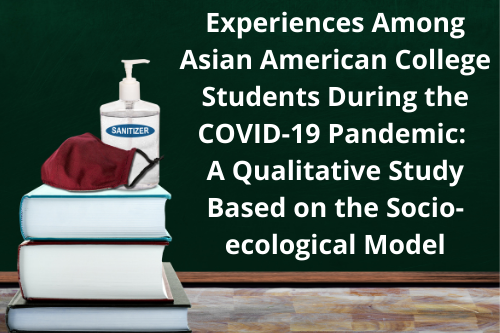March 2022 Events
Spring 2022 CROCCA
CROCCA, the Consortium for Research on Contemporary China and Asia, provides a forum for graduate students and faculty to present, discuss, and explore collaboration in social science research on Asia.

Racial and ethnic mental health disparities during the COVID-19 pandemic: The role of experienced and perceived discrimination
Presenter: Ming Wen
- Professor, Sociology Department
Racial and ethnic minorities often suffer from poor mental health outcomes due to multiple factors and these disparities may be exacerbated during the COVID-19 pandemic. This study examined mental health differences across whites (reference), blacks, Hispanics, Asians, and others in the USA and among Asian Americans. It also explored whether experienced and perceived racial discrimination mediated the observed group differences. This study used data from the Health, Ethnicity, and Pandemic Study, a nationally representative cross-sectional survey conducted in October 2020 that oversampled Asian Americans. Mental health was captured by the Kessler Distress Scale-6 (6 items; α=0.91; ranged from 6 to 30). Discrimination was measured by experienced racial-ethnic discrimination (1 item; dichotomous), experienced racial-ethnic cyberbullying (1 item; dichotomous), and perceived racial bias to own racial/ethnic group (7 items; α=0.89). Weighted OLS regression analyses were performed. Our results showed that Hispanics reported the highest level of psychological distress after controlling for age and biological sex but not controlling for SES. Meanwhile, Asians reported the highest level of psychological distress after controlling for age, biological sex, and SES, and this disadvantage was “explained away” by experienced and perceived discrimination. In the Asian subsample, Southeast Asians exhibited the highest level of distress which could be attributed to their relatively lower SES compared to other Asian ethnic groups. Interestingly, Chinese, particularly scapegoated and negatively stereotyped during the pandemic, were less distressed than non-Chinese Asians in our sample, mainly due to their higher SES. After controlling for discrimination, the Chinese participants’ advantage in distress became even stronger, suggesting they did experience more severe discrimination but their higher SES offset the potentially devastating mental impact of this stressor.
 Experiences Among Asian American College Students During the COVID-19 Pandemic: A
Qualitative Study Based on the Socio-ecological Model
Experiences Among Asian American College Students During the COVID-19 Pandemic: A
Qualitative Study Based on the Socio-ecological Model
Presenter: Akiko Kamimura
- Associate Professor, Department of Sociology
- Adjunct Associate Professor, Division of Public Health
- Adjunct Associate Professor, Department of Health, Kinesiology, and Recreation
The purpose of this study is to examine experiences among Asian American college students during the COVID-19 pandemic. Six focus groups were held online via Zoom with a total of 21 participants in October and November 2020. The focus group guide was built upon the socio-ecological model. Some participants expressed distress when having to leave their houses for pandemic safety and discrimination reasons. The impact of discriminatory events was addressed by participants’ families. Participants emphasized the importance of communities and local organizations during the COVID-19 pandemic. Participants indicated that showing support for the Asian American community through social media and public awareness campaigns could be useful in stopping the stigma associated with the COVID-19 pandemic. Understanding the experiences of Asian American college students during the COVID-19 pandemic provides insight on how to better support Asian American communities during the pandemic.
 ORBEM Magazine Special Edition 110 Anniversary of the Mexican Consulate in Salt Lake
City Conversation and Info Session
ORBEM Magazine Special Edition 110 Anniversary of the Mexican Consulate in Salt Lake
City Conversation and Info Session
El Consulado de México en Salt Lake City celebra el 110° aniversario de su fundación, 110 años de estar al servicio de la comunidad mexicana. ¿Pero cómo se decidió que esta circunscripción necesitaba de una célula diplomática? ¿Cuál fue el interés real de la apertura de estas oficinas? El Cónsul José Lozano y Castro, llegó a la ciudad de Salt Lake el día 17 de julio de 1911. El Sr. Lozano y Castro envía un telegrama mediante la Mexican Telegraph Company al Director General de Consulados de México solicitando instrucciones para la recepción de la oficina Consular con dirección en el Hotel Cullen.
El Consulado pretende conmemorar tal fecha con la organización de múltiples eventos culturales, incluyendo un conversatorio, un artículo académico publicado bilateralmente (MX-EU), un número especial para la revista ORBEM.
 When Words Heal
When Words Heal
Order your copy of This is my Brain in Love from The King's English Bookshop and receive a 20% discount.
Despite the huge increase in mental health awareness across the world, suicide rates are the highest they've been in twenty years. What role can teachers and librarians play in helping kids navigate tough times? What does good mental health representation look like? I.W. Gregorio will talk about the choices she made while writing her Schneider Award-winning THIS IS MY BRAIN IN LOVE and highlight other important books with neurodiverse characters.
Author: I.W. Gregorio
I. W. Gregorio is a practicing surgeon by day, masked avenging YA writer by night. After getting her MD at Yale, she did her residency at Stanford, where she met the intersex patient who inspired her debut novel, None of the Above (Balzer + Bray / HarperCollins), which was finalist for the 2016 Lambda Literary Award, a Spring 2015 Publishers Weekly Flying Start, an ALA Booklist Top Ten Sports Book for Youth, and a 2015 ABC Children’s Group Best Book for Young Readers. It was also named to the 2016 American Library Association Rainbow List. Her second novel, This is My Brain in Love, is forthcoming in April 2020 from Little, Brown Books for Young Readers. She is proud to be board member of interACT: Advocates for Intersex Youth, and is a founding member of We Need Diverse Books™ and its former VP of Development. Her writing has appeared in The Washington Post, Newsweek, San Francisco Chronicle, San Jose Mercury News, New York Daily News, Scientific American and Journal of General Internal Medicine, among others. A recovering ice hockey player, she lives in Pennsylvania with her husband and two children.
This event is sponsored by the Asia Center at the University of Utah and READ-U.

Muslim Youth Conference
 How Can We Stop AAPI Hate and Bias? Research and Policy Perspectives
How Can We Stop AAPI Hate and Bias? Research and Policy Perspectives
Hate against Asian American Pacific Islander communities has risen in recent years. Join us as researchers and policymakers discuss this growing issue and consider ways to reverse this troubling trend.
Panelists:
- Russell Jeung, PhD, Professor of Asian American Studies, San Francisco State University, and Co-Founder, Stop AAPI Hate
- Senator Jani Iwamoto, Assistant Minority Whip, Utah State Senate, District 4 - Salt Lake, Millcreek, Holladay, Murray
- Alex Hohl, PhD, Assistant Professor, Department of Geography, University of Utah
 Transnational Asia Conference
Transnational Asia Conference
Session 1:
- "Creating a Japanese Christianity" (Brayden Lane)
- "Tales of Tokyo" (Jonah Harris)
- "Internationalizing the Lost Cause" (Makoto Hunter)
- "Same-Sex Love in Meiji Japan" (Molly K. Rhodes)
Session 2:
- "Helen Foster Snow" (Brady Turpin)
- "Western Female Missionaries in China" (Cathy Flake)
- "Sun Yat-sen: a transnational life" (Stanley Fieeiki)
- "Adapting the Three Kingdoms" (Jackson Keys)
Session 3:
- "Opium: the unseen threat" (Michael Green)
- "The Failed British Mission to China" (Kiner Kwok)
- "The Amritsar Massacre" (Eliza Whiting)
Session 1:
- "Frank Lloyd Wright and Wabi Sabi" (Carrie Call)
- "Gustave Le Bon in A Madman's Diary" (Chienyn Chi)
- "Anime and bai-he man-hwa" (Derek Burns)
Session 2:
- "The Spain in Chinese Hearts" (Morgan Rocks)
- "Social Gospel's Social Enginerring" (Derek Burns)
Session 3:
- "Retelling Crown Prince Sado" (Dason Han)
- "Bengali Transnational Families" (Ghazi Rahman)
- "Japanol: a trans-language approach" (Tanya Flores)
Session 4:
- "Globalizing Projects' in Thailand" (Lauren Collins)
- "Cambodian Connectoins" (Walter Jones)
